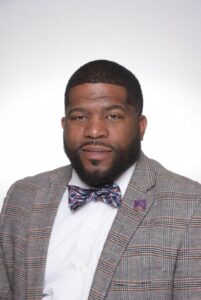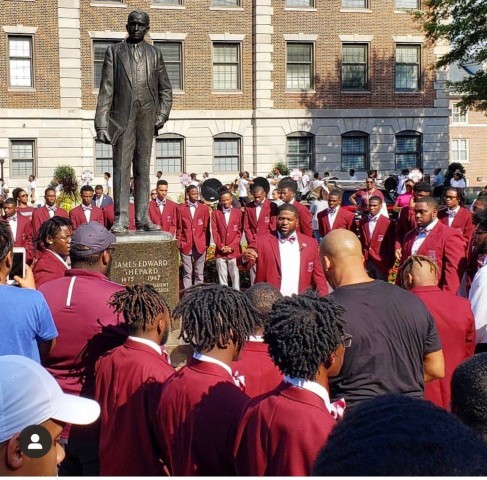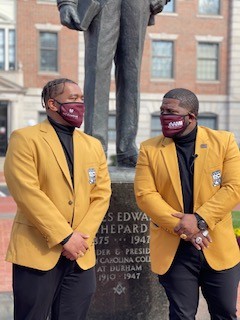 Today we’d like to introduce you to Dr. Roderick Heath.
Today we’d like to introduce you to Dr. Roderick Heath.
Hi Dr. Heath, thanks for sharing your story with us. To start, maybe you can tell our readers some of your backstories.
I am a first-generation college graduate of North Carolina Central University in 2006. I dropped out of college three times before enrolling at North Carolina Central University at the age of 22. During that process I had to learn how to be a better person and I had to figure out what I wanted out of life. Before enrolling into North Carolina Central University, my life consisted of many failures, trauma, and disappointments. Throughout all my childhood and young adult failures, I became Dr. Roderick Heath in 2022.
Growing up in the small town of Monroe, NC I always knew there was more to life than that small town. Throughout my life, I watched the pitfalls of many men that grew up around me. The city of Monroe like many other small towns had its share of racial issues and a more evitable drug war steaming from the Ragan era. I’ve watched so many lives ruined by these social issues. For many people in my city, the only opinion was to work at the local chicken plant, which is the main source of income for the majority of African American families. My grandmother worked for Tyson’s Chicken plant for 35 years. I can recall her telling me that when she started working at the chicken plant, she made $4.25 per hour. As many of her children didn’t finish high school, they transitioned to the chicken plan as well. Being that I was raised in a large family, we were able to survive due to my grandparents working and growing most of their food on their land. I can remember my grandmother getting off work, and she would change her clothes before entering our house. The strong smell of blood and raw chicken stained her work uniform, but she still managed to put her pride aside because she knew this was her only way of life. My grandfather was a quiet man; he never really talked much. He worked for the City of Monroe in the maintenance department for about 30 years. He was a hardworking man, and I would watch him get off work and start working in his garden. My grandparents were uneducated, but the life lessons shown to me as a child still provides me with structure in my adult life.
My mother has had her share of struggles as she dealt with her narcotic issues throughout her life. My father wasn’t around much, and I learned quickly that I had to navigate this world on my own. As a teenager, I had my grandparents for guidance, but they were older and couldn’t keep up with my social growth as a young black male. The only outlet I had at that time was sports, but I struggled emotionally as a lost young male. Playing high school football provided me with an outlet to release my anger due to the physical contact that it provided. Playing football, I gained the nickname “Hamma”. This name derived from the physical aggression I displayed while on the field, but people failed to realize that this was a cry for help. I wanted everyone that I came in contact with to feel the personal pain that carried with me daily. I wanted the world to feel my pain; I didn’t have a father that I could vent to; so I had no superman in my life. Imagine watching other players talk with their fathers during and after games. These would turn into emotional jealousy. Seeing families in the stands yelling their lungs out while rooting for their children was a hard pill to swallow.
My anger pushed me to be one of the top players in my county, but due to my family’s educational background, no one taught me that education would get me out of this hellhole that I was living in my mind. Being raised in a single parent made school optional; I pressed to get good grades in school, so when the college football scouts came to see me, there weren’t any options. This was my senior year, and I had a 1.9 GPA with no plans for the future. I can recall one scout looked me in my eyes and said, “You’re a hell of a player, but you hadn’t done any work in high school.” I stood there in shock as he walked out of the coach’s office as the door slammed behind him. My dreams of becoming a college player walked out with the college scout; I knew that my NFL chances were now over. My heart was broken after this experience. Where was my superman?
Lost in college
After having my dreams crushed by the football scout, I didn’t apply to any colleges during my senior year. No one had ever talked with me about college. Therefore, I didn’t have dreams of being a doctor, lawyer, or any other professional career. During the final two months of my senior year of high school, I hadn’t yet created a plan of action. One Friday afternoon around noon, I decided to skip my math class to parlay with my friends in the 2nd lunch pod my life changed forever. Usually, when someone skips class it’s a bad thing to do, but on this date, a recruitment officer from Livingstone College was still in the courtyard informing students about their campus. As an inquisitive person, it was by chance that the recruitment officer was looking for African American Males to attend their college. After discussing the benefits of the college with me, he informed me that I could play football once I arrived. In my mind, I knew this opportunity was a no-brainer; yet I still hadn’t taken into consideration that I would have to attend classes once I arrived on a college campus.
Moreover, I applied to the college and I was accepted into Livingstone College. When I arrived on campus on that hot August day in the summer of 1999, I only had two boxes of clothes and the $45.00 that my grandparents had given me as my departing gift. The following day after unpacking my belongings, I made my way to the football coach’s office to let him know that I was ready to play for the team. This encounter is a day I will always remember, but the coach looked at me and said, “Who are you?” I was like the recruitment officer told me that I could join the team once I arrived on campus. The coach looked at me and said, “Son, we already have all our players; you were misinformed.” As I picked my face and pride off the floor, I walked out of the office in disbelief, enraged, and hurt. I didn’t want to be on campus anymore. So, for the next six weeks, I only attended class five times that semester. Once again, I didn’t have anyone to vent my frustration to, and I hadn’t met any African American men on campus that took the time to invest in me. Moreover, after the Thanksgiving break, I packed all of my belongings and dropped out of college. Still to this day, I have yet to return to Livingstone College. Where was my superman; I felt like the world let me down again.
Alright, so let’s dig a little deeper into the story – has it been an easy path overall, and if not, what were the challenges you’ve had to overcome?
Growing up in a single-parent home and being raised by my grandparents, I witnessed my mother struggle personally. Throughout my life, I witnessed her deal with abuse boyfriend that resulted in him shooting her when I seventeen. This resulted in me growing up being angry at the world and my father who was never present in my life. Seeing your mother suffering from a gunshot wound to the head change my life forever. In that moment I new that my life needed purpose. It wasn’t until I enrolled into North Carolina Central University that my love for education was reborn.
Thanks for sharing that. So, maybe next you can tell us a bit more about your business?
As higher education faces staging retention numbers from African American males the school-to-prison pipeline has become a reality, and its impact is all too familiar in the lives of African American males. Research implies that throughout African American males’ K-12 journey their potential is often cut short due to a political education system that affects the transition of black males, particularly young men from single-parent homes. In addition, research also indicates that single parents tend to be less able to support their children’s schooling through supervision and monitoring of their school work (Zill, 1996) and they may have lower expectations regarding their children’s school achievements (Entwisle, Alexander, & Olson, 1997). Oftentimes many of these young men manage to navigate their negative situations and enroll on college campuses. During this process, many harbor baggage from the perils of single-parent homes. High non-marital birth rates among Blacks and the large share of Black children raised in female-headed households created a matriarchal society that undermined the role of Black men (Acs et al., 2013).
My company The Higher Education Black Male Collective is to establish and foster a sense of unity, strength, leadership, and economic mobility for Black males across nations’ higher education spectrum. It is our goal to support the academic, social, and intellectual evolution of African American male undergraduate and graduate students.
The Black Male Collective fosters relationships among black males across the nation and provides the leadership skills that are needed to overcome societal barriers. In addition, BMC will create a space for black men to take ownership of their current campus and community.
Before we go, is there anything else you can share with us?
I’m also the Director of the Men’s Achievement Center at North Carolina Central University.
The mission of the African American Male Initiative (AAMI) is to provide its members with relevant academic, professional, and social experiences that stimulate personal ambitions and development in the following areas: academic success; mentorship; identity/self-esteem; leadership; community involvement; and cultural and spiritual enlightenment, and a sense of brotherhood.
African American Male Initiative enhances the University in the following ways:
- An inclusive environment where all people are valued for their individual differences through quality programs and student support services.
- Retain students with high GPAs (2.8 or higher) through graduation.
- Assist the University in their established retention strategies.
- Promote and increase faculty-student interaction.
- Provided tangible skills needed to assist in students’ transition from high school to college as well as from being a boy to man.
- Develop and enhance characteristics needed for our male students to be conscientious, pragmatic, and honorable young men.
- Connect students with the many resources offered by the Institution.
- Collaborate with other departments and units to promote student success.
- Attack and defeat stereotypes of minority male students.
- Present leadership opportunities.
- Engage scholarship beyond the Institution.
Contact Info:
















